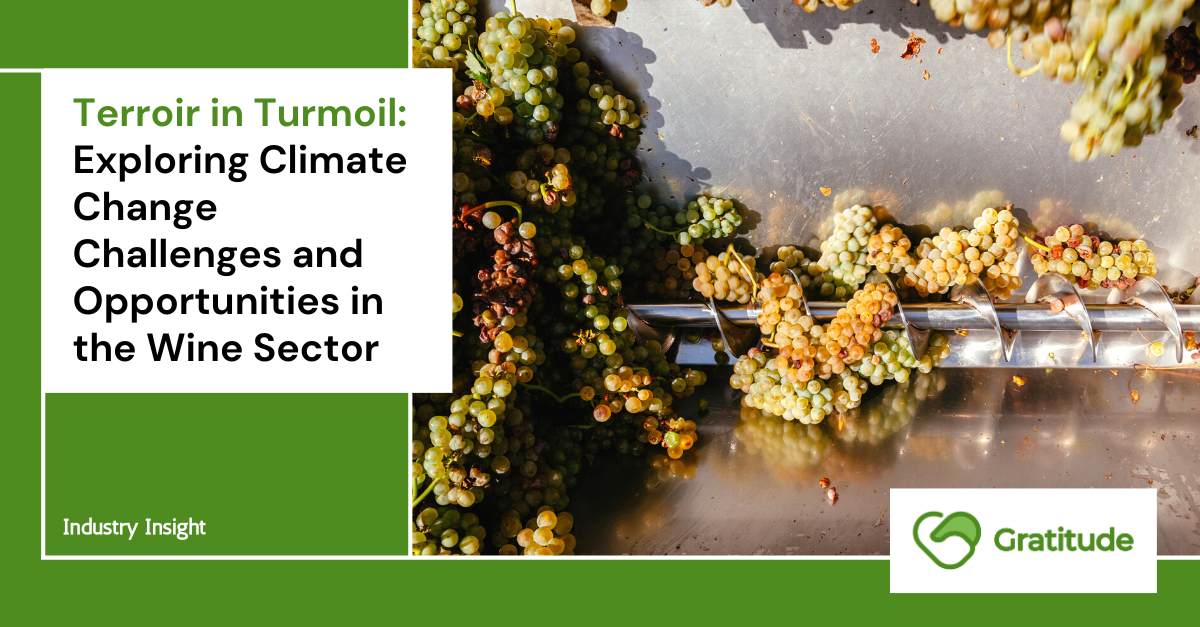The wine industry, deeply rooted in tradition and terroir, is standing at the forefront of climate change impacts. Terroir, a French term embodying the unique characteristics of a wine region including its soil, climate, and topography, is being significantly altered by the changing climate. This article delves into the challenges posed by climate change to the wine sector and the innovative opportunities being harnessed to ensure sustainability and preservation of terroir.
Climate Change Challenges
- Temperature Rise and Harvest Timing:
With global temperatures on the rise, the traditional timing of grape harvests has been disrupted. Earlier harvests, though yielding sweeter grapes, often result in wines with higher alcohol content and less acidity, altering the traditional flavor profiles of certain wine regions.
2. Extreme Weather Events:
Unpredictable weather events such as frosts, storms, and droughts have become more common, threatening vineyards. For instance, the devastating frosts in France in 2017 resulted in one of the smallest harvests in decades.
3. Pest and Disease Pressure:
Warmer temperatures create conducive conditions for the proliferation of pests and diseases. The spread of pests like the grapevine moth has been noted in regions previously unaffected.
Opportunities to Innovate
With the challenges mentioned above, arise an opportunity to come out with solution to evolve the industry for the better. Here are some of them that are out in the market already :
1. Climate-Resilient Grape Varieties:
Winemakers are experimenting with climate-resilient grape varieties. For instance, Portugal’s wine industry is exploring indigenous grape varieties known for their drought tolerance.
Technological Innovations:
Technology is playing a pivotal role in adapting to climate change. Precision agriculture, utilizing drones and sensors, enables vintners to monitor vine health and optimize water use.
2. Sustainable Viticulture Practices:
Winemakers are adopting sustainable practices like organic farming, water conservation, and soil management to mitigate climate change impacts.
Case Study — The Champagne Region:
The Champagne region in France has been proactive in tackling climate change challenges. The region has committed to reducing its carbon emissions by 75% by 2050. Innovative practices such as adopting lighter-weight bottles, which reduce transportation emissions, and employing organic farming practices have been instrumental in progressing towards this goal.
The complex narrative of climate change intertwines challenges and opportunities within the wine sector. The essence of terroir, pivotal to the identity of wines, is under threat yet it also forms the foundation of innovative, sustainable solutions. One such solution is the integration of sustainability certifications which not only helps in navigating the climate crisis but also in resonating with the eco-conscious consumer.
A noteworthy platform facilitating this change is SipLabel.com. SipLabel offers a bridge between winemakers and consumers, promoting transparency and sustainability in wine production. By harnessing services like SipLabel, the wine industry can not only adapt to the climatic challenges but also foster a culture of sustainability and informed choice. As we toast to the resilience and innovation in the wine sector, platforms like SipLabel are instrumental in steering the industry towards a sustainable, climate-resilient future.
Are your wine business looking for a platform to narrate your wine’s story, EU compliance, and become more transparent in the future? Talk to our representative for FREE at :
Website : https://siplabel.com
Twitter : https://www.twitter.com/more_gratitude
Linkedin : https://www.linkedin.com/company/more-gratitude
Instagram : https://www.instagram.com/more_gratitude/
Facebook : https://www.facebook.com/followgratitude
Medium : https://www.medium.com/@more_gratitude
Sign up to our exclusive newsletter for special offers and latest industry insight :

